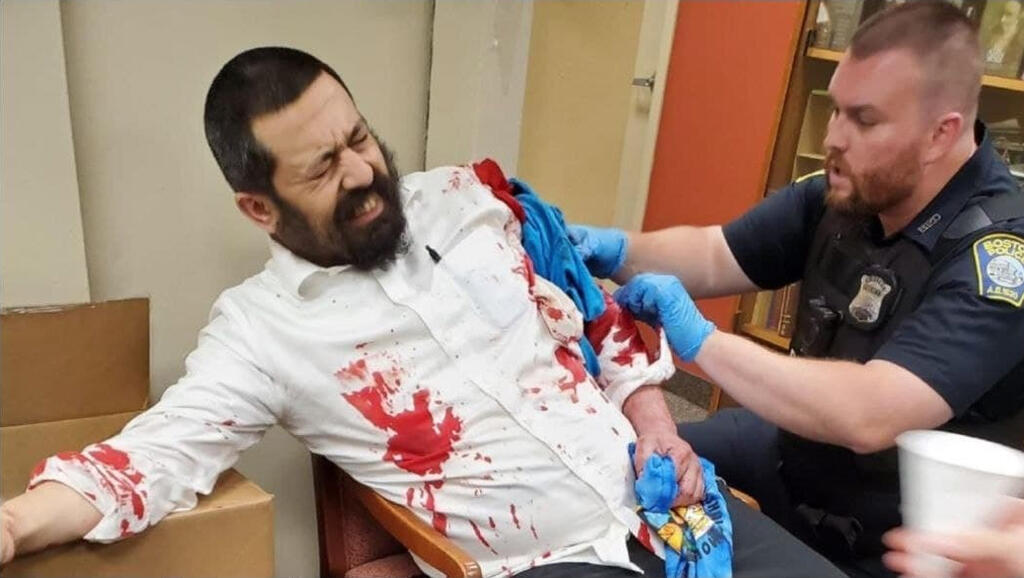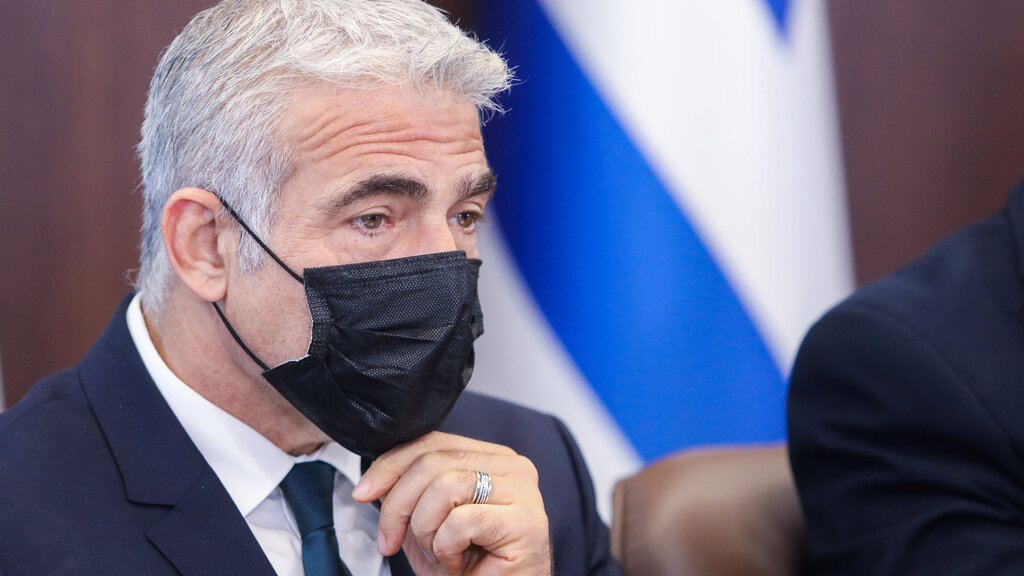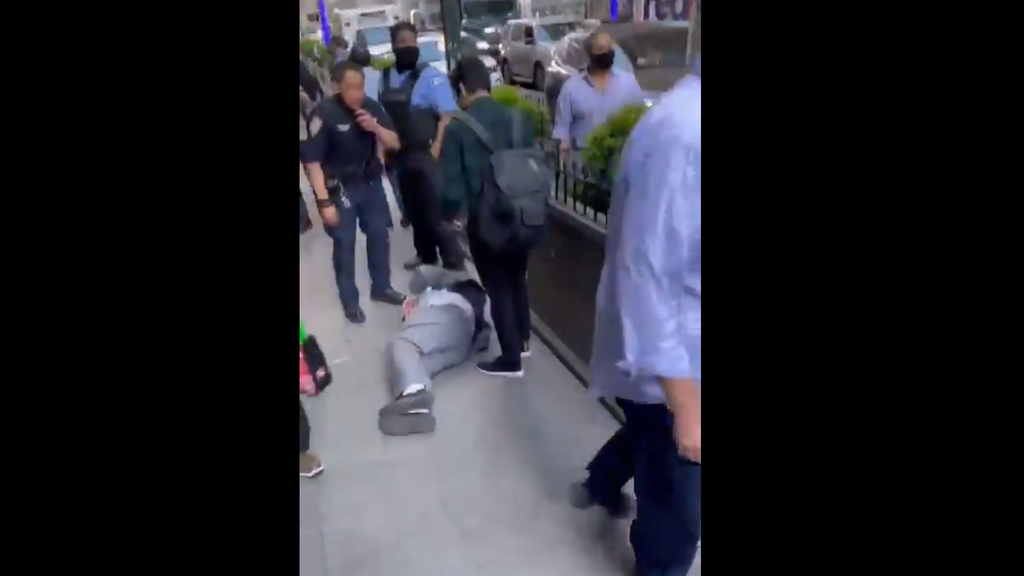Jews beaten by pro-Palestinian thugs in broad daylight in downtown Manhattan. Jews assaulted by a mob at a sushi restaurant in Los Angeles hours later. Synagogue windows smashed in Arizona, Illinois and cities across Europe. Convoys of cars driving through London’s streets with a loudspeaker threatening the rape of Jewish girls.
Participants in a three-day conference on anti-Semitism, held this week in Jerusalem under the auspices of the Foreign Affairs and Ministry of Diaspora Affairs Ministry, voiced grave concern over the dramatic spike in attacks on Jews and Jewish institutions worldwide in recent months, and their belief that a new form of anti-Semitism with unprecedented potency is emerging.
7 View gallery
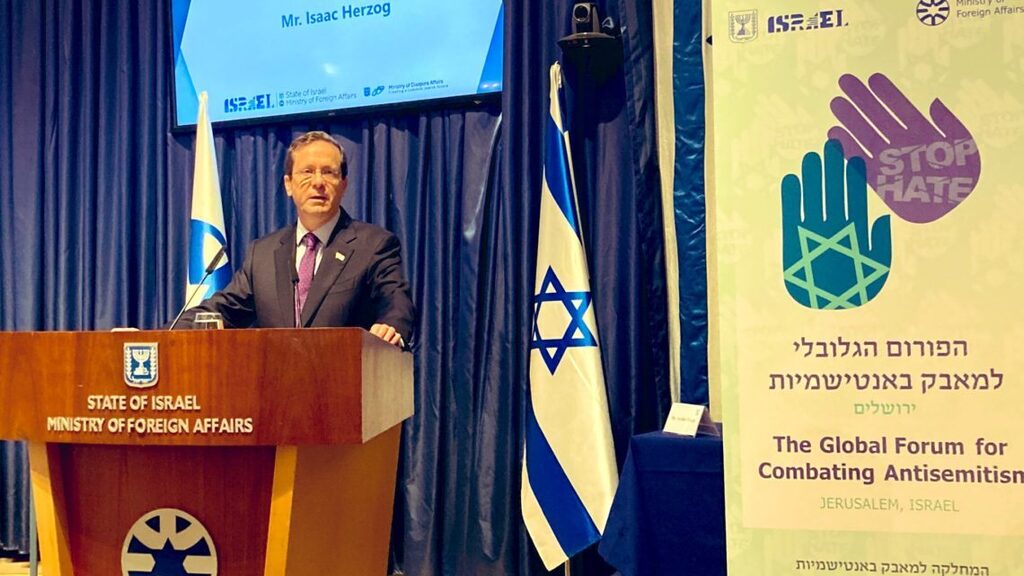

President Isaac Herzog speaks at the opening of the 7th Global Forum for Combating Antisemitism in Jerusalem on July 13, 2021
(Photo: Twitter/Israel Foreign Ministry)
“This conference is very timely, because the challenge is becoming much more difficult and bigger,” President Isaac Herzog, in his first public appearance at an international event since assuming office on July 7, said in a keynote address on Tuesday launching the 7th Global Forum for Combating Anti-Semitism.
“All of a sudden the ground exploded in a very disturbing way all throughout the world, and we have seen things that we haven’t seen for many decades – direct physical violence against Jews in London and in other places in Europe and the United States,” Herzog said.
Figures presented by delegates at the conference paint a grim picture. The number of anti-Semitic incidents rose 75% in the U.S. and 591% in the UK during the latest round of Gaza violence, the Anti-Defamation League reported.
But while intermittent fighting between Israel and Gaza terror groups has frequently spilled over into violence targeting Jews on the streets of cities in numerous countries over the past decade, speakers at this week’s conference − both Israeli officials and senior leaders of Jewish organizations in the U.S. − warned against what they described as a new form of violence, one which exploits possibly legitimate anti-Israel sentiments and protests as a guise for unabashed, deep-seated anti-Semitism.
7 View gallery
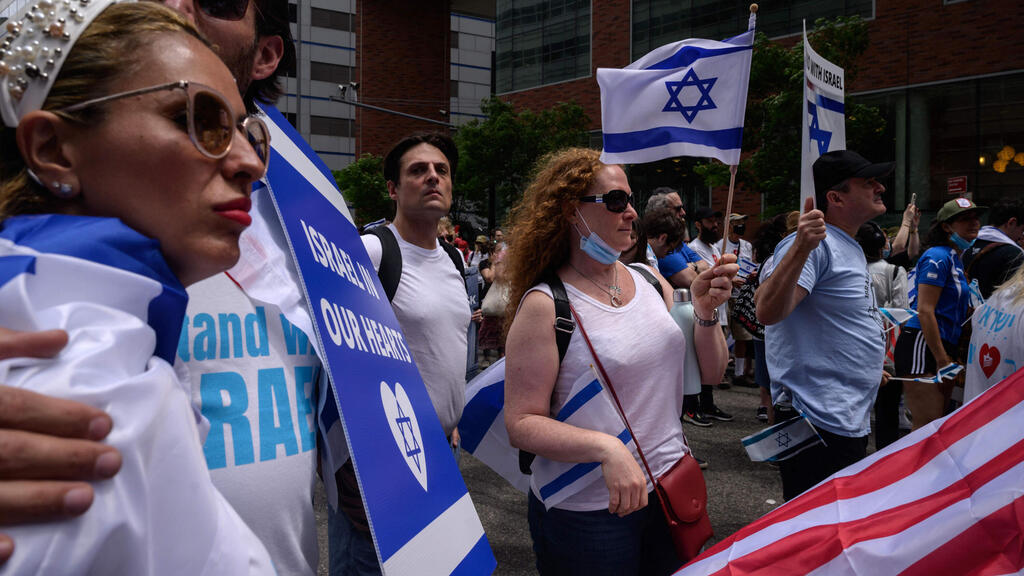

Pro-Israel demonstrators attend a rally denouncing anti-Semitism in Manhattan, May 23, 2021
(Photo: AFP)
The idea that anti-Zionism and anti-Semitism are intimately intertwined went unchallenged at the conference. But this notion is not new, and has been the subject of heated debate in academic and media circles in the U.S. and Europe for well over a decade.
“What we’ve experienced during and after Operation Guardian of the Walls is a paradigm shift,” William C. Daroff, CEO of the Conference of Presidents of Major American Jewish Organizations, said in a speech on Wednesday.
“The combination of movements and events that nurtured, encouraged and legitimized anti-Zionism and provided a license to discriminate against and target Jews for their possible association with the Jewish state … It has been clearly demonstrated in the past few months that the line between anti-Zionism and anti-Semitism has almost ceased to exist,” he also said.
Daroff emphasized the key role of new media in the current spike in anti-Semitic incidents.
“The anti-Semitic messaging we see on social media is not new. What is new is that the platforms can now spread like wildfire and become part of public consciousness around the world. We need to adapt. Just as anti-Semites are employing new tools and techniques, we need to modernize how we attack the problem,” he said.
Conference attendees argued that a new actor, namely the radical Left in both Europe and the U.S., is fanning the flames of anti-Israel sentiment, inevitably contributing to anti-Jewish violence, alongside the political and social exclusion of Jews.
7 View gallery
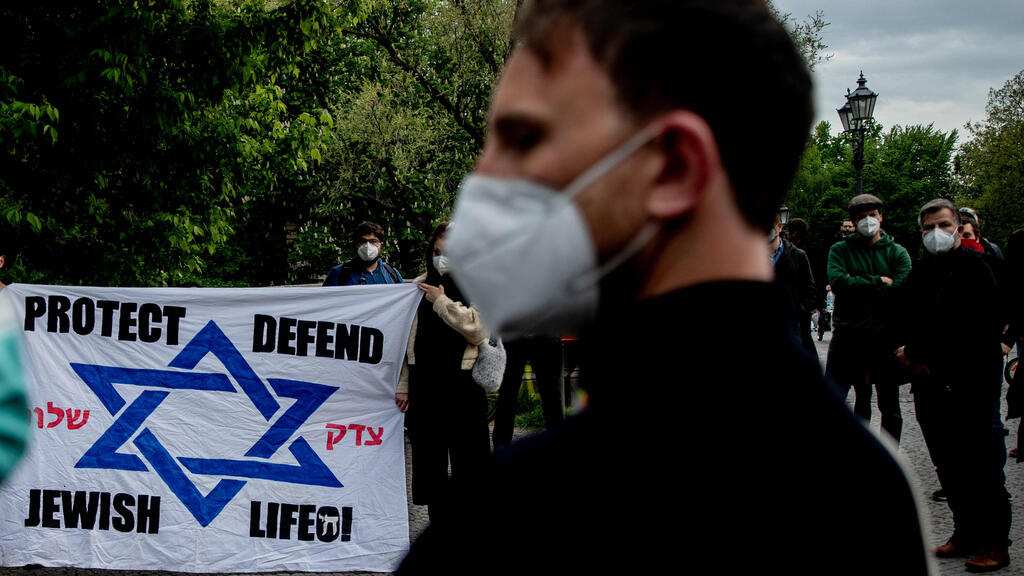

Participants at a vigil against anti-Semitism gather in front of the a synagogue in Berlin, May 16, 2021
(Photo: EPA)
“This is a new global trend that we are witnessing in many capitals … we saw in the most severe way the conflation of anti-racism with progressive social justice rhetoric [spilling] onto the Israeli-Palestinian conflict,” Dr. Sharon Nazarian, senior vice president of International Affairs at the Anti-Defamation League, said during a plenary session on Wednesday.
“So, it’s about color power issues, about privilege, and yet that movement was put on the Palestinian-Israeli conflict. This was the first time we were seeing much more pervasive, much more mainstream,” she said.
Attacks on Jews “do not occur in a vacuum,” Nazarian said. “They are partly fed by a growing mainstreaming of anti-Israel approaches within certain parts of American society and in parts of Congress.”
Senior Israeli government officials seem to be adopting a radically new strategy for dealing with the issue, one that has been advocated for more than a decade by the member states of the Organization for Security and Cooperation in Europe (OSCE), which suggests that anti-Semitism should be tackled in general forums dedicated to racism and discrimination, and not as a stand-alone issue.
“We’ve come to a reality and times in which hate crimes and hate speech against Blacks are unacceptable, but unfortunately hate crimes and hate speech against Jews are,” Lior Haiat, spokesman for the Foreign Ministry, told The Media Line before the conference.
“We have to unite the fight against racism, whether it’s anti-Semitism, racism against Blacks and Asians, xenophobia, Islamophobia, because every time a law [is introduced] against racism, anti-Semitism should be part of it. You cannot divide the fight. … It’s the same enemy or the same phenomenon that we have to fight globally,” Haiat said.
Foreign Minister and Alternate Prime Minister Yair Lapid, whose father and grandmother were rescued from the Nazis in Budapest by Raoul Wallenberg, echoed this approach in his speech on Wednesday.
“The anti-Semites were not only in the Budapest Ghetto. The anti-Semites were also slave traders who threw people bound together with chains into the sea. … The anti-Semites are Muslim fanatics who have murdered millions of other Muslims in the past decades. The anti-Semites are ISIS and Boko Haram, the anti-Semites are people who beat LGBT people to death,” he said.
Defeating anti-Semitism requires allies, Lapid said.
“We need to enlist everyone who believes it is wrong to persecute people just because of their religion, sexuality, their gender, their nationality or the color of their skin. … The fight isn’t between anti-Semites and Jews. The fight is between anti-Semites and anyone who believes in the values of equality, justice and freedom,” he said.
Educating the masses and global cooperation are two main strategies for the fight against anti-Semitism that were emphasized at the conference. The first stage to this is for as many governments and organizations as possible to adopt the International Holocaust Remembrance Alliance’s (IHRA) Working Definition of Anti-Semitism.
“There is a consensus among those in attendance – as there is within the Jewish community – that it is vital to use the IHRA definition as a tool to educate and help determine acts of discrimination,” Daroff told The Media Line.
“We at the Conference of Presidents work with our member organizations to develop plans of action and find areas of coordination, including educating on the importance and potential uses of the IHRA Working Definition as an important tool in identifying and fighting hate. As discussed at this conference, anti-Semitism is not just a threat to Jews, but to the health of our democracies,” he said.
For the ADL, the preferred strategy is developing and mobilizing allies in the fight to win hearts and minds.
“When you have the NBA put out a tweet not only fighting against anti-Semitism, but also talking about how Israel is [defamed] …, these voices matter,” Nazarian said.
“Allies showing up for us at this moment is critical. We need to ask them to do that. We have to call on them and say, ‘We need you at this moment.’ We have to ask all our communities, all our partners, all our allies, to stand up at this moment. It is critical for them to do so,” she said.
Some allies who came for this week’s conference include Frankfurt Mayor Uwe Becker, who is also the anti-Semitism commissioner for the German state of Hesse; Mayor of Greater Manchester Andy Burnham; Roko Kursar, deputy mayor of Malmö, Sweden; Conservative Member of Parliament Christian Wakeford, co-chair of the All-Party Parliamentary Group on British Jews; and officials from the Chelsea Football Club and Borussia Dortmund, two renowned soccer teams that have launched their own projects for combating anti-Semitism.
The ADL, which has established a Center for Technology and Society in Silicon Valley, began to engage with the social media giants more than a decade ago in what Nazarian described as the group’s two-track strategy: first offering to work together and come up with solutions, and later going on the offensive.
“In 2019 we started a campaign called ‘Stop Hate for Profits.’ We know that platforms’ choices are driven by their profits. And so that campaign was a month [long], advocating for major companies and major corporate brands to take a month’s pause from purchasing ads on Facebook. And we think it was quite impressive. … We can’t keep the pressure on, but as far as campaigns are concerned, there are different players and social media should not be” allowed to go unchallenged, she said.
For some delegates at the conference, patience is running out.
“I learned in NGO diplomacy that anger should rarely be a policy. It should not emerge in discussions. But I come before you today in anger, in sheer, unadulterated anger,” David Harris, CEO of the American Jewish Committee, said in an emotional speech.
“In the year 2021, we have to get together in order to discuss this issue in depth? Because it presents a clear and present danger to Jews and to liberal democratic values around the world, including the U.S.?” he said.
7 View gallery
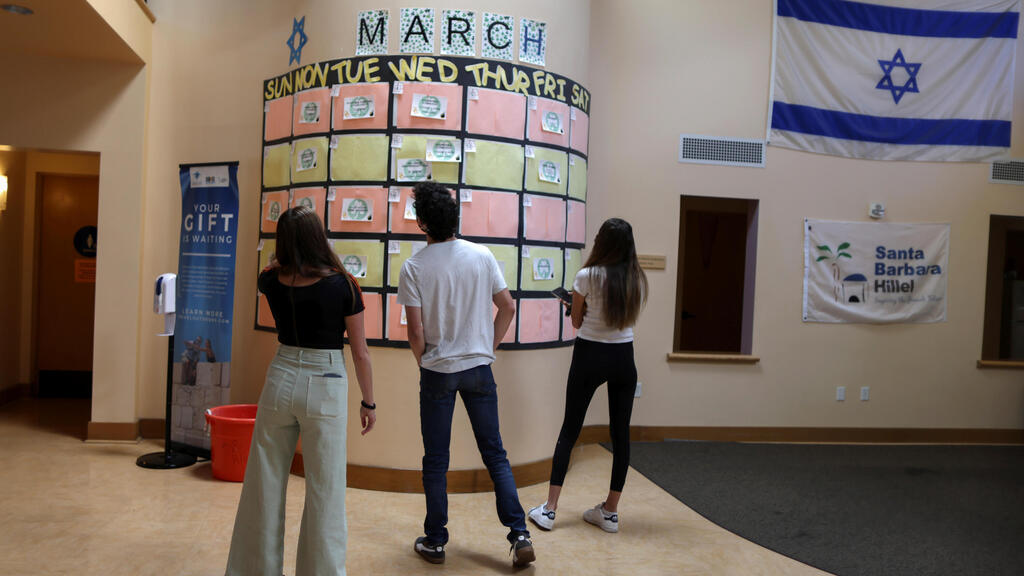

Jewish students at the University of California campus at Saint Barbara
(Photo: Reuters)
“We talk about education and Holocaust education and we must, but is has become some kind of ritualistic conversation. … Where is the outrage?” he asked.
“My message is: Discover the outrage, nurture the outrage, show the outrage. … Fighting anti-Semitism is not for the faint of heart, for the weaklings. Fighting anti-Semitism requires a sustained focus, a strong spine, and political purge. It’s time for us to stand up, speak out, and demand from our officials that we receive the same protection as all others. … Stand up or be called out,” Harris said.
Edward Isaacs, 19, who studies politics and international relations at the University of Bristol in England and is head of its Jewish students’ association, has more modest expectations.
In February, the school’s Professor David Miller called for the “end of Zionism,” said Israel is “trying to exert its will all over the world,” and said members of the University of Bristol Jewish Society were being used as “political pawns by a violent, racist foreign regime.”
The All-Party Parliamentary Group Against Anti-Semitism accused Miller of “inciting hatred against Jewish students.”
Isaacs, who is about to begin his sophomore year, wants and demands a safe space for the school’s Jewish students, so that they do not feel apprehensive about being Jewish or expressing their beliefs.
The article is written by Gur Solomon. Reprinted with permission from TheMediaLine


